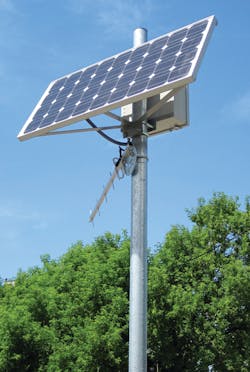Dero ZAP Applies RFID Technology to Get Bike Commuting Programs Rolling
Universities and colleges, non-profit organizations, and private and public employers alike are endeavoring to promote commuting by bike as an environmentally friendly and healthful transportation alternative. However, the lack of a practical and reliable way to tally bike trips has held back their efforts to encourage and reward biking. At the Association for the Advancement of Sustainability in Higher Education (AASHE) annual conference in Pittsburgh, Dero (booth #415) announced the solution: Dero ZAP. A solar-powered, automated RFID (Radio Frequency Identification) system with integrated hardware and software, Dero ZAP is the answer for managing and monitoring bike commuting.
"About half of all daily commutes are five miles or less. To reward such commuters who get out of their cars and onto their bikes for going to work or class, accurate data are essential to determine eligibility and calculate incentive rewards," said Rolf Scholtz, president of Dero. "Dero ZAP overcomes the biggest barrier to starting, sustaining and growing bike commuting programs: counting and reporting."
"Until now, everything has been based on the honor system, and organizations don't typically offer incentives for results based on the honor system," said Steve Sanders, Bike Coordinator, Parking and Transportation Services, University of Minnesota, Minneapolis. "Implementing this technology solution is our way to confirm that people are actually using their bikes and then reward them."
Every day some 6,500 cyclists make their way across the University of Minnesota on bicycles. The University has begun installing 20 Dero ZAP units at its Minneapolis and St. Paul campuses. One is centrally located at the University's new Bike Center.
Dero ZAP uses the same technology as RFID systems that identify eligible automobiles for single-occupancy drivers who pay for the privilege of using High Occupancy Vehicle (HOV) lanes on highways. However, with Dero ZAP, instead of promoting car traffic, the technology is used to encourage people to leave their cars parked and commute by bike.
Bike commuting managers use a simple web-based interface to the Dero ZAP system software to enroll participants and register a unique RFID tag to each rider. The tamper-proof tags are attached to the spokes of bikes' front wheels. Solar-powered ZAP units, mounted on steel poles, identify registered bikes from up to 30 feet away.
When an enrolled bicyclist rides into the zone of a ZAP station, the unit acknowledges their arrival with an audible beep and flashing light. The ZAP unit records the arrival and transmits the data wirelessly to a central web server. Administrators then access the data via the web to tally bike commuter arrivals, determine eligibility for bike commuting incentives, and calculate rewards. The data also support analysis of bicycling transportation patterns.
"No more cumbersome, time-consuming manual counting or each rider logging every ride. No more questionable counts with under-reporting or over-reporting," said Hans Steege, chief executive officer, Dero. "With Dero ZAP, counting is automated, counts are precise, and reports credible. And that enables colleges, non-profits, and corporations to scale up bike commuting programs as a serious transit option."
Dero donates 15 percent of Dero ZAP revenues to KidCommute, a non-profit organization dedicated to battling childhood obesity by encouraging kids to bike or walk to and from school in order to improve their health.


